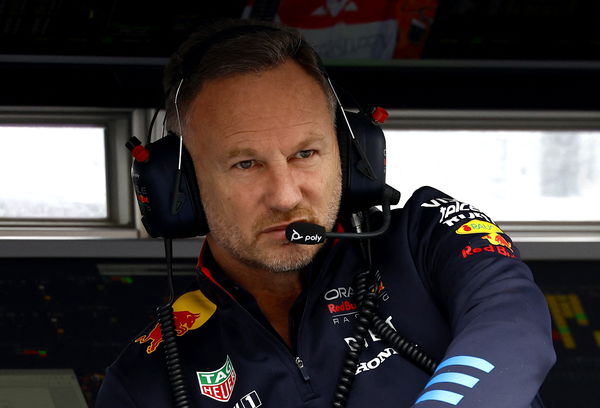
via Reuters
Formula One F1 – Japanese Grand Prix – Suzuka Circuit, Suzuka, Japan – April 5, 2024 Red Bull team principal Christian Horner during practice REUTERS/Issei Kato

via Reuters
Formula One F1 – Japanese Grand Prix – Suzuka Circuit, Suzuka, Japan – April 5, 2024 Red Bull team principal Christian Horner during practice REUTERS/Issei Kato
The year 2026 is going to be crucial for F1. Engine and chassis regulations will undergo a drastic overhaul. This could be the make-or-break point for many drivers. Meanwhile, not just F1, but several teams are also going through a renovation. The new regulations demand a better plan and the perfect blend of power and speed. And while one might expect Red Bull to stick to Honda, given their engines have done them wonders for years now, the story is different.
Red Bull has decided to start its engine project. They thought about it in 2021 itself when Honda decided to part ways with them, however, they took back their word and decided to continue till the end of 2025. With a contract extension with the Japanese manufacturers not feasible anymore, Red Bull will build its own engines now.
Meanwhile, Red Bull Powertrains is stepping into the spotlight, marking a significant change and challenge for the team amid evolving regulations and competition. A recent tour of Milton Keynes’ Jochen Rindt building has led to massive revelations. A selective team of American media was granted access to the campus, opening doors that are usually shut. And the information they’ve shared with the world is rather shocking. Christian Horner stands at the center of the conversation and being the boss around there, his claims wouldn’t be inaccurate.
ADVERTISEMENT
Article continues below this ad
Christian Horner and Co. believe they can supply engines to at least four F1 teams
Red Bull is usually secretive when it comes to their upcoming plans and internal strategies. Well, why should their rivals know what’s going on? Many aspects of their cars are kept hidden from the public eye. But now, as they’ve opened the doors to Milton Keynes, their mammoth project has come forth. The Red Bull Powertrains, equipped in the Jochen Rindt building, can supply engines to four F1 teams. While it can support Red Bull Racing and VCARB, there is still room for two additional customer teams. However, they might not be added until 2026.
Christian Horner informed: “We have already been approached by various parties, some teams are testing who gets the most competitive engine. But our focus at the moment is completely on the two Red Bull teams because we want to learn to walk before we run.” It is not surprising that Horner currently wants to focus on the main team and its daughter team. He further said: “If something comes up later, we are open to the right partner. With the facilities we have here, we can supply engines to four teams. That is not a problem in terms of supply.” Red Bull could also supply their engines to Alpine who’ll be parting ways with Renault soon.

via Reuters
Formula One F1 – Hungarian Grand Prix – Hungaroring, Budapest, Hungary – July 21, 2024 Red Bull’s Max Verstappen in action during the race REUTERS/Bernadett Szabo
Horner notes that the financial rules for engine supplies need revision, as he commented, “With the prices that the FIA uses, supplying a customer engine would even be loss-making.” The Red Bull team principal also expressed, “I almost feel sympathy for Cyril,” referring to his former Renault rival Cyril Abiteboul.
Looks like Christian Horner has taken a slight dig at Renault. Well, he has a valid point, given how the two parties ended their contract. Since then, the French manufacturers have deteriorated exponentially.
ADVERTISEMENT
Article continues below this ad
Red Bull and Renault’s split: A tale of rise and fall
When the regulations changed in 2014, Red Bull took a considerable backseat, as they felt that with Renault, they weren’t partnering with the best engine in the F1 hybrid engine era. Cyril Abiteboul‘s company didn’t devote enough time, money, and manpower to the new hybrid engines and consequentially from 2014, Red Bull fell behind.
Then in 2018, the Austrian brand started looking for new manufacturers who could give them ‘the’ engine. This is when Honda came into the picture. Shifting wasn’t easy. They got no results from Ferrari and Mercedes, which left them with the choice of staying with Renault or switching to Honda. So Red Bull took the risk and introduced Honda’s engines into their cars. And did those engines work just the way they wanted? Oh, yes! All the three championships that Max Verstappen won, were with Honda’s engine, and as the current table stands, the Dutchman could win the ongoing season as well. If it happens, it’ll be with the Japanese engine again.
ADVERTISEMENT
Article continues below this ad
Despite the symbiotic relationship with Honda, Red Bull is looking ahead to take further risks. Christian Horner doesn’t want to remain a dependent customer, rather he wants to now become the manufacturer of engines- drawing in customers. You could call this a role reversal! Overall, the scenes at Milton Keynes have made one thing clear: Red Bull isn’t backing down at all. Their projects have already begun and their targets for 2026 are set.
What do you think about Red Bull producing its own engines? Let us know in the comments.
ADVERTISEMENT
ADVERTISEMENT
ADVERTISEMENT
ADVERTISEMENT

